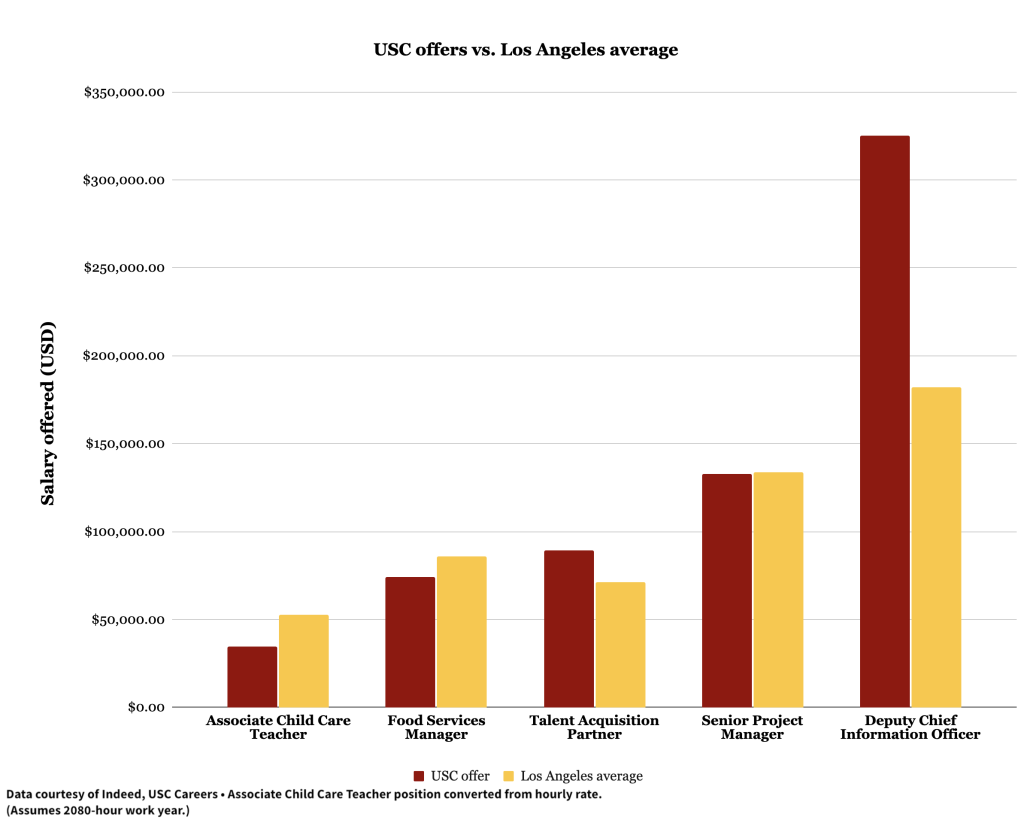New state law sheds light on USC wages

California now requires employers with at least fifteen workers to report salary ranges in job postings, as of Jan. 1. It is not the first or only state to do so: Similar laws in Washington and Rhode Island also went into effect at the turn of the new year, joining Nevada, Colorado, Connecticut, Maryland and a handful of cities and counties. USC, the second-largest private employer in Los Angeles County with 28,119 faculty, staff and student workers as of the 2021-22 academic year, is also subject to the new law.
Wages have been a subject of contention at the University for several years, recently spotlighted in April, when janitors contracted under Aramark protested alongside students and faculty members for higher wages and better healthcare benefits. Graduate student workers are also in the process of unionizing in hopes of negotiating for higher compensation, following a national reckoning over universities’ treatment of academic workers spurred by a historic strike across University of California campuses.
The Daily Trojan compiled and analyzed data for 50 recent USC job postings at the date of publication, taking into consideration the position, department and hourly wages or salaries. Postings are from Jan. 2-9. Also included in the analysis are 100 other job postings from Nov. 22 to Dec. 30, compiled and posted to Reddit by a graduate student who granted permission to use their data set and requested to remain anonymous due to privacy concerns.
Postings from the Keck School of Medicine have been excluded from both data sets because of the large quantity of open positions, out-of-state positions that are not subject to the new law and different regulations for minimum wages and benefits. Not all USC departments are reflected in the data.
A model created by Dr. Amy Glasmeier, professor of economic geography and regional planning at the Massachusetts Institute of Technology, calculates the living wage for a single adult with no children living in L.A. County to be $21.89 an hour. This, according to the model, is the minimum an individual must earn to support themself, assuming they work full-time — 40 hours a week, 52 weeks a year.
Six of the fifty most recent postings, all of them within Auxiliary Services, offer significantly less than this calculated living wage. A “Culinary Specialist” at Burger Crush makes $19.92 an hour. A host at the University Club would earn $18.77 an hour. Two postings, including one for a hotel service worker position, pay exactly the L.A. city minimum wage, at $16.04 an hour.
Last year’s postings paint a fuller picture. Five of nine Auxiliary Services positions listed are below the Glasmeier model’s living wage, including a Trojan Grounds Starbucks cashier position at $18.84 an hour. Financial Business Services offers $19.84 for a mail and material handler and $20.49 for an accounting assistant. An associate child care teacher at University Relations would earn $16.58, just over half a dollar more than minimum wage and far below the city-wide average for a child care teacher, at $25.27.
A majority of these positions do not require a college degree; in contrast, the University often offers competitive, if not above-average, salaries for positions that do require a bachelor’s degree or above. A deputy chief information officer at Information Technology Services can earn anywhere between $300,000 and $350,000, either way almost double the city’s average for such a position. A senior project manager position at the USC Credit Union just about hits the average mark at $132,591.50.
The University wrote in a statement to the Daily Trojan Thursday that it is “committed to maintaining institutional compliance with all laws, including those relating to minimum wage and pay transparency.”
“When extending an offer of employment, the University considers factors such as (but not limited to) the scope and responsibilities of the position, the candidate’s work experience, education/training, key skills, internal peer equity, federal, state and local laws, contractual stipulations, grant funding, as well as external market and organizational considerations,” the statement read.
Wages offered for Auxiliary Services positions are mostly union-bargained, a University spokesperson said, and are coupled with benefits packages for employees and their families in accordance with negotiated contracts. Offers for hospitality positions also take tips into consideration, the spokesperson said.
A spokesperson for UNITE HERE Local 11, a union representing USC hospitality workers, did not respond to multiple requests for comment.

Some businesses have responded to the new pay transparency law by exploiting weaknesses in its wording to their advantage. Big Tech companies, in a precedented move, posted excessively wide salary ranges: an L4 software engineer position at Netflix now offers anywhere between $90,000 and $900,000, which the company justified as the “overall market range for roles in this area.” Tesla employed a similar strategy, offering $104,000 to $348,000 for its own software engineer position.
USC, meanwhile, is including its pay ranges only after an introduction and five or six other sections, including the job description and necessary qualifications. A typical posting for Auxiliary Services lists the range after about 700 to 900 words, which is similar to the length of this article. Information Technology Services postings have almost 1,300 words before the range appears.
Whereas other listings — including the $90,000 to $900,000 Netflix position — separate the range as a standalone paragraph, University positions include it within a paragraph that reads exactly like the University’s Thursday statement. The result is a job posting with no immediately visible statement of a pay range.
The University declined to comment on the matter, instead referring to a Mar. 29 memo from President Carol Folt on “long-term plans for increasing faculty and staff compensation,” including a $700 million investment “over the next five years to support performance-based salary increases, related employee benefits, and market adjustments.”
“Our strategy is to bolster the excellence and innovation of our academic programs, strengthen our workforce, retain critical talent, ensure our job descriptions describe current roles and responsibilities, address compensation inequities, and systematically raise salaries to be competitive in one of the country’s most expensive job markets,” the memo read.

